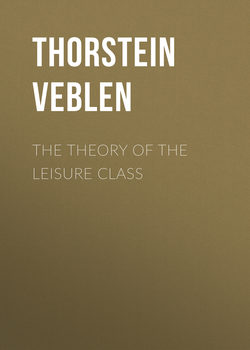The Theory of the Leisure Class

Реклама. ООО «ЛитРес», ИНН: 7719571260.
Оглавление
Thorstein Veblen. The Theory of the Leisure Class
Contents. Chapter One ~~ Introductory
Chapter Two ~~ Pecuniary Emulation
Chapter Three ~~ Conspicuous Leisure
Chapter Four ~~ Conspicuous Consumption
Chapter Five ~~ The Pecuniary Standard of Living
Chapter Six ~~ Pecuniary Canons of Taste
Chapter Seven ~~ Dress as an Expression of the Pecuniary Culture
Chapter Eight ~~ Industrial Exemption and Conservatism
Chapter Nine ~~ The Conservation of Archaic Traits
Chapter Ten ~~ Modern Survivals of Prowess
Chapter Eleven ~~ The Belief in Luck
Chapter Twelve ~~ Devout Observances
Chapter Thirteen ~~ Survivals of the Non-Invidious Interests
Chapter Fourteen ~~ The Higher Learning as an Expression of the Pecuniary Culture
Отрывок из книги
In the sequence of cultural evolution the emergence of a leisure class coincides with the beginning of ownership. This is necessarily the case, for these two institutions result from the same set of economic forces. In the inchoate phase of their development they are but different aspects of the same general facts of social structure.
It is as elements of social structure—conventional facts—that leisure and ownership are matters of interest for the purpose in hand. An habitual neglect of work does not constitute a leisure class; neither does the mechanical fact of use and consumption constitute ownership. The present inquiry, therefore, is not concerned with the beginning of indolence, nor with the beginning of the appropriation of useful articles to individual consumption. The point in question is the origin and nature of a conventional leisure class on the one hand and the beginnings of individual ownership as a conventional right or equitable claim on the other hand.
.....
There are, moreover, measureable degrees of conformity to the latest accredited code of the punctilios as regards decorous means and methods of consumption. Differences between one person and another in the degree of conformity to the ideal in these respects can be compared, and persons may be graded and scheduled with some accuracy and effect according to a progressive scale of manners and breeding. The award of reputability in this regard is commonly made in good faith, on the ground of conformity to accepted canons of taste in the matters concerned, and without conscious regard to the pecuniary standing or the degree of leisure practised by any given candidate for reputability; but the canons of taste according to which the award is made are constantly under the surveillance of the law of conspicuous leisure, and are indeed constantly undergoing change and revision to bring them into closer conformity with its requirements. So that while the proximate ground of discrimination may be of another kind, still the pervading principle and abiding test of good breeding is the requirement of a substantial and patent waste of time. There may be some considerable range of variation in detail within the scope of this principle, but they are variations of form and expression, not of substance.
Much of the courtesy of everyday intercourse is of course a direct expression of consideration and kindly good-will, and this element of conduct has for the most part no need of being traced back to any underlying ground of reputability to explain either its presence or the approval with which it is regarded; but the same is not true of the code of properties. These latter are expressions of status. It is of course sufficiently plain, to any one who cares to see, that our bearing towards menials and other pecuniary dependent inferiors is the bearing of the superior member in a relation of status, though its manifestation is often greatly modified and softened from the original expression of crude dominance. Similarly, our bearing towards superiors, and in great measure towards equals, expresses a more or less conventionalised attitude of subservience. Witness the masterful presence of the high-minded gentleman or lady, which testifies to so much of dominance and independence of economic circumstances, and which at the same time appeals with such convincing force to our sense of what is right and gracious. It is among this highest leisure class, who have no superiors and few peers, that decorum finds its fullest and maturest expression; and it is this highest class also that gives decorum that definite formulation which serves as a canon of conduct for the classes beneath. And there also the code is most obviously a code of status and shows most plainly its incompatibility with all vulgarly productive work. A divine assurance and an imperious complaisance, as of one habituated to require subservience and to take no thought for the morrow, is the birthright and the criterion of the gentleman at his best; and it is in popular apprehension even more than that, for this demeanour is accepted as an intrinsic attribute of superior worth, before which the base-born commoner delights to stoop and yield.
.....